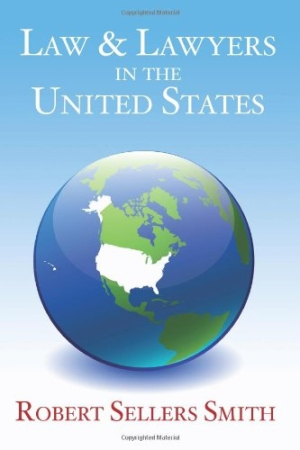It looks like you've stumbled upon a page meant to be read by our code instead of viewed directly. You're probably looking for this page.
Law & Lawyers in the United States
Who knew that American Samoa is the only one of the fifty-six states and territories of the United States without a bar association? Robert Sellers Smith knows, as will anyone who reads the short passage about that Pacific island in his Law & Lawyers in the United States.
Smith’s book is a quick reference guide and handbook to all things legal in the United States and its territories. Much of it reads like an old high school civics textbook, with the majority of the content presented in a fairly cut-and-dried manner. Few members of Smith’s profession will find anything in this book that they do not already know, but the text is not intended for lawyers. It is written for people who know little or nothing about law or who are confused by the different types and levels of law in the US.
“The American legal profession, with over 1.2 million lawyers and growing,” states Smith, who joined their ranks in the 1950s, “is the largest in the world, both absolutely and probably in proportion to population.” That the United States has more lawyers than soldiers (the active, reserve, and National Guard forces combined total 1.1 million) or doctors (954,000) is unsettling, and it speaks to the litigious and argumentative state of the nation. Equally disquieting is Smith’s note that “over 44 thousand Juris Doctor (J.D.) degrees are awarded each year.” By contrast, only 18,000 students enter medical schools in the US per year.
Smith also provides his readers with a thumbnail summary of the Constitution and its amendments. Unfortunately and surprisingly, he does get one wrong—or rather, he is selectively incomplete in his rendering of it. In condensing the Second Amendment to saying it is a law that “provides the right of the people to keep and bear arms,” Smith leaves out the first phrase that references the importance of having an armed and regulated militia. How the first part applies to the second is and has been a key part of the debate on what restrictions and limitations the government is allowed to place upon a weaponized citizenry.
This one controversial point aside, Smith’s book is a must-have compilation of all things legal for the layman. Smith has done an excellent job of making the law and the legal system understandable to anyone with an interest in the subject matter. For people who do not know the difference between trademark, patent, and copyright law, or who do not know that there are three types of bankruptcy, this book is a must.
Budding lawyers may also find this book of value, if only because it lists the address of the bar association in every one of the states, districts, territories, and possessions of the United States—with the exception, as noted above, of American Samoa, whose lawyers must leave their tiny island paradise to file their cases in the federal courts of Hawaii or the District of Columbia.
Reviewed by
Mark G. McLaughlin
Disclosure: This article is not an endorsement, but a review. The publisher of this book provided free copies of the book and paid a small fee to have their book reviewed by a professional reviewer. Foreword Reviews and Clarion Reviews make no guarantee that the publisher will receive a positive review. Foreword Magazine, Inc. is disclosing this in accordance with the Federal Trade Commission’s 16 CFR, Part 255.
